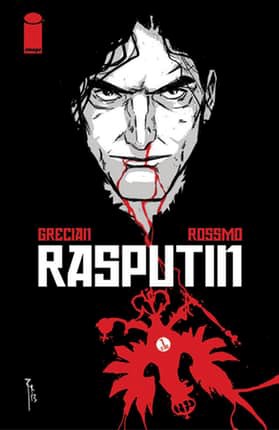Rasputin #1
Written by Alex Grecian
Art by Riley Rossmo
Image Comics
“Grigori Yefimovich Rasputin … was a Russian peasant, mystical faith healer and a trusted friend to the family of Nicholas II, the last Tsar of Russia. He became an influential figure in Saint Petersburg, especially after August 1915 when Nicholas took command of the army at the front.
“There is much uncertainty over Rasputin’s life and the degree of influence he exerted over the shy and irresolute Tsar and Alexandra Feodorovna, his nervous and depressed wife. Accounts are often based on dubious memoirs, hearsay and legend,” details Wikipedia.
Think about the era, the first great war, mix in the exotic world of Russia at the time, and then add all the myth around Rasputin, and writer Alex Grecian found one of those rich veins from history that create compelling comics.
Some of the best stories are those with a thread of reality tying it together. The story is more interesting when you realize there are elements that are real, but you are not quite sure which elements are real, and which are from the mind of the writer.
With a character like Rasputin it works about as well as it can.
It helps that the art is by Riley Rossmo, a Canadian so I’m a fan. I also met him at a show once, where he signed a cover of Proof #1, so he gets added fandom from me for that too.
But back to Rasputin #1, it won’t be for everyone, but it is worth a read, and many will find it a gem.
The Infinite Loop TPB
Written by Pierrick Colinet
Art by Else Charretier
IDW Publishing
This 180-page tome collects the series into one meaty edition.
Considering how wild a ride The Infinite Loop is, I can’t actually imagine trying to keep up if you had it doled out 25-pages a month.
Writer Pierrick Colinet takes on the idea of time travel, and that is always an interesting topic for sci-fi.
You can take a fun approach, like Chronnauts, or you can get down into the idea of slight changes creating waves, which then necessitates somebody working in the shadows to fix things before the waves get out of hand.
Colinet opts for the deeper approach, and he sets that against some political elements, and morale ideas of acceptance of those who are different.
Frankly this is one that might have been better served in a 500-page novel. There is just a bit too-much going on here to come across just right in a comic.
It’s not a complete fail by any means, but I am not honestly sure I understood a good portion of the ‘science’ at play here. It was just a bit too complex for the medium, and for my reading pleasure.




